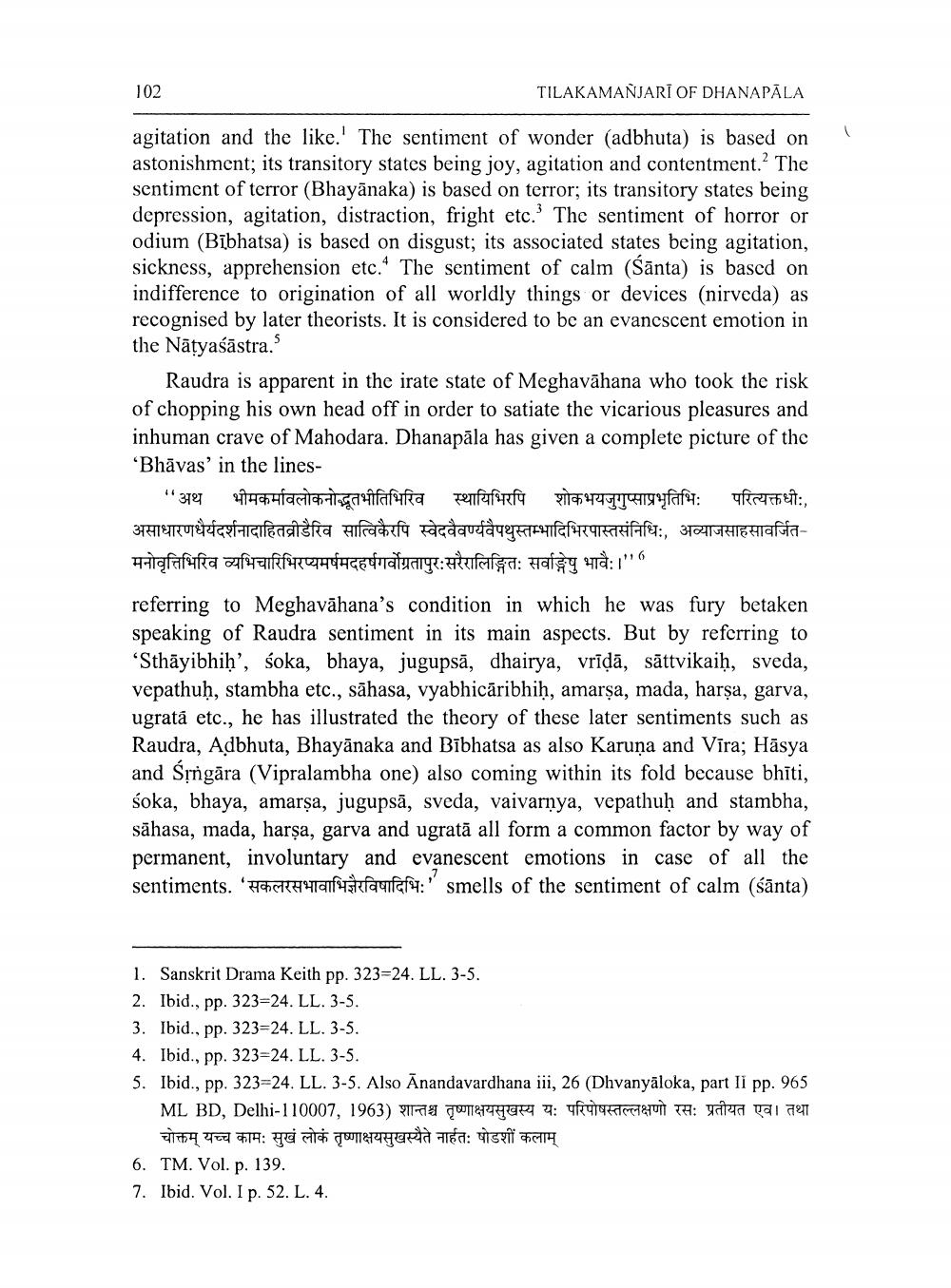________________
TILAKAMANJARĪ OF DHANAPALA
agitation and the like.' The sentiment of wonder (adbhuta) is based on astonishment; its transitory states being joy, agitation and contentment. The sentiment of terror (Bhayanaka) is based on terror; its transitory states being depression, agitation, distraction, fright etc.' The sentiment of horror or odium (Bibhatsa) is based on disgust; its associated states being agitation, sickness, apprehension etc. The sentiment of calm (Śanta) is based on indifference to origination of all worldly things or devices (nirveda) as recognised by later theorists. It is considered to be an evanescent emotion in the Natyaśāstra.
102
Raudra is apparent in the irate state of Meghavahana who took the risk of chopping his own head off in order to satiate the vicarious pleasures and inhuman crave of Mahodara. Dhanapala has given a complete picture of the 'Bhavas' in the lines
"3727
भीमकर्मावलोकनोद्भूतभीतिभिरिव स्थायिभिरपि शोकभयजुगुप्साप्रभृतिभिः परित्यक्तधीः, असाधारणधैर्यदर्शनादाहितव्रीडैरिव सात्विकैरपि स्वेदवैवर्ण्यवैपथुस्तम्भादिभिरपास्तसंनिधिः, अव्याजसाहसावर्जितमनोवृत्तिभिरिव व्यभिचारिभिरप्यमर्षमदहर्षगर्वोग्रतापुरःसरैरालिङ्गितः सर्वाङ्गेषु भावैः ।" "
referring to Meghavahana's condition in which he was fury betaken speaking of Raudra sentiment in its main aspects. But by referring to 'Sthayibhiḥ, śoka, bhaya, jugupsā, dhairya, vrīḍā, sāttvikaiḥ, sveda, vepathuḥ, stambha etc., sahasa, vyabhicāribhiḥ, amarṣa, mada, harṣa, garva, ugratá etc., he has illustrated the theory of these later sentiments such as Raudra, Adbhuta, Bhayanaka and Bībhatsa as also Karuna and Vīra; Hasya and Śṛngāra (Vipralambha one) also coming within its fold because bhiti, śoka, bhaya, amarṣa, jugupsā, sveda, vaivarnya, vepathuḥ and stambha, săhasa, mada, harṣa, garva and ugrată all form a common factor by way of permanent, involuntary and evanescent emotions in case of all the sentiments. 'सकलरसभावाभिज्ञैरविषादिभि:' smells of the sentiment of calm (Śānta)
1. Sanskrit Drama Keith pp. 323-24. LL. 3-5.
2. Ibid., pp. 323-24. LL. 3-5.
3. Ibid., pp. 323-24. LL. 3-5.
4. Ibid., pp. 323-24. LL. 3-5.
5. Ibid., pp. 323-24. LL. 3-5. Also Anandavardhana iii, 26 (Dhvanyāloka, part li pp. 965 ML BD, Delhi-110007, 1963) शान्तश्च तृष्णाक्षयसुखस्य यः परिपोषस्तल्लक्षणो रसः प्रतीयत एव । तथा चोक्तम् यच्च कामः सुखं लोकं तृष्णाक्षयसुखस्यैते नार्हतः षोडशीं कलाम्
6. TM. Vol. p. 139.
7. Ibid. Vol. I p. 52. L. 4.




